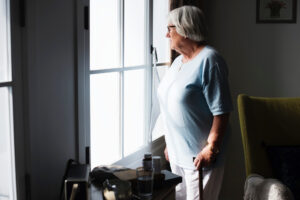By Nance Ebert, Contributing Writer

REGION – Everything seems to be more expensive these days―groceries, school tuition, home purchases, gas, rent and more. So many people are impacted, especially those just starting out on their own and seniors, many of whom are retired or soon to be exiting the job market.
Rising rents are met with frustration and many housing options are just not attainable anymore.
Cost burden heavy for seniors
This has had a huge impact on our aging population and is causing many hardships. In some cases, landlords are selling the building that this age group has been living in for years. All of a sudden, a new landlord comes in and sends a letter to the tenants informing them of their new rent, which in certain circumstances, the tenant can no longer afford to pay.
In an article for the Joint Center for Housing Studies at Harvard University, Jennifer Mokinsky emphasizes the fact that we, as a population, need to invest more in housing needs of our country’s older population.
“There is an enormous unmet need for affordable rental housing for older adults,” Mokinsky wrote. “Over 10 million households headed by someone sixty-five and over are cost burdened (paying more than a third of their income on housing); half of these pay more than fifty percent.”
“Nearly three-quarters of renters earning under $15,000 per year are cost burdened. To compensate, households often cut back on food and medical care, which can be detrimental for those with chronic health condition,” she continued. “Renters, often on fixed incomes, are particularly at risk of rising housing costs, and have a much smaller personal safety net.”
In some instances, the rentals that are available might not be easily accessible. The doorways might not be wide enough to accommodate a wheelchair and some modifications might need to be made. Older adults might additionally need support with their daily living and need some type of transportation to get to necessary services.
“I have been renting this apartment since 2012 and, thank goodness, I have a good relationship with my landlord,” said Betty Pulera of Lenox. “Three years ago, he came to visit, which resulted in a rent increase. While I was not happy about it, he assured me that this increase would be the last one while I resided here.”
“I will be turning 91 next month and I am grateful that my husband and I planned for our retirement,” Pulera noted. “I would suggest to the younger generations that they think about it now even though it might not feel relevant.”
Pandemic worsened the problem
As a result of the Covid-19 pandemic, many seniors lost their employment and fell behind in their rent. There were many evictions across the country and older people were forced to move in with friends or family or face homelessness. Older renters may have exhausted their retirement savings and be living alone, where they bear the brunt of high monthly rental fees. Developers as well seem to be constructing high-end rental units that truly are not geared for an older population on a fixed or limited income.
An issue brief titled, “Low-Income Older Adults Face Unaffordable Rents, Driving Housing Instability and Homelessness” from justiceinaging.org provides additional insight. “Research demonstrates that affordable housing can improve overall health by freeing up needed dollars to pay for food and health care expenditures. Rent-burdened older adults who are paying excessive amounts of their income for housing often are left with insufficient resources for other essential needs, including food, medical insurance, and healthcare.”
Getting help
There are many elderly assistance programs in Massachusetts that have taken steps to ensure aging adult economic security. This includes SNAP benefits (food stamps), economic assistance (cash benefits, Councils on Aging and Senior Centers, prescription drug assistance) and more. In the state of Massachusetts, applicants for senior housing must have an annual income no greater than 80 percent of their area’s median income.
There is a waiting list for public housing and it can take from one year to five years, depending on your application status. CHAMP (Common Housing Application for Massachusetts Public Housing) is used to apply for site-based, state-funded housing that includes both housing for the elderly and disabled as well as family housing.
The Executive Office of Elder Affairs is the state entity most focused on this issue. “EOEA is dedicated to ensuring the 1.7 million older adults in the Commonwealth have the resources they need to live and thrive in the community of their choice,” the EOEA said in a statement. “This includes ensuring older adults are financially and economically secure.”
Increasing rent puts a heavy burden on older people, especially those with fixed and limited resources. Constantly worrying about this increased monthly expense is very stressful and can lead to health problems.
For additional information go to the National Council on Aging website at www.ncoa.org or the Massachusetts Executive Office of Elder Affairs (EOEA) at https://www.mass.gov/orgs/executive-office-of-elder-affairs.
RELATED CONTENT:
Tips on coping with inflation (fiftyplusadvocate.com)
Shipping container homes becoming a lower-cost housing option (fiftyplusadvocate.com)
Cohousing another option for some people as they age (fiftyplusadvocate.com)












